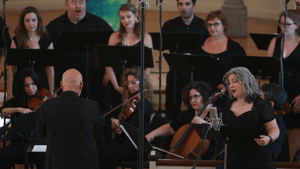Stay in the Loop
BSR publishes on a weekly schedule, with an email newsletter every Wednesday and Thursday morning. There’s no paywall, and subscribing is always free.
Setting sail with the Crossing choir
The Crossing presents 'Month of Moderns: Voyages'

It’s a challenge to pick through and interpret Hart Crane’s dense poem "Voyages." But the Crossing choir, always seeking new musical horizons, sailed beautifully into those poetic waters in its second 2018 “Month of Moderns.”
Tempest toss'd
For this Sunday afternoon concert at their acoustically rich home base (the Presbyterian Church of Chestnut Hill), Donald Nally’s estimable ensemble sang only two works, both settings of Crane’s groundbreaking poem, a sequence of six long stanzas about the contradictory depths of love. He wrote Voyages over five years in the early 1920s, exploring and expressing (at least in part) his passion for Danish sailor Emil Opffer.
Crane was not pursuing chronological narrative and linguistic sense. Rather, he created an open and unabashedly Romantic/romantic poem written during — and almost in defiance of — the high modernism of Deco culture.
He plays with grammar, meter, sense, rhythm and poetic styles, an amalgam rich with love's confusion. Though the work threatens to fly out of control, Crane never really leaves the bounds of the many poetic conventions he utilizes. Thus, this text is a perfect vehicle for the Crossing’s sonorous layers and searching aestheticism.
Swept away
The program’s first half was an elegant and richly textured a cappella work by Curtis alum and New York composer Robert Convery. Frequently commissioned worldwide, Convery has written before for the group, and the ensemble beautifully showcased his elegant and transparent lyricism.
Convery set Crane’s entire poem (all 950 words) and wrote this 1993 work in five days, so it has a sweep that matches the text’s rushing urgency. The composition is filled with close, sometimes Britten-esque harmonies that move and flow, often resolving into unexpected and satisfyingly rich chords. In pre-concert remarks, the composer noted that this cantata’s six movements follow the poet’s structure, each musically drawing on the one before.
Though he sometimes drops into the text to illuminate specific words, Convery chooses to echo the poem’s sweep: Sea images are especially freighted with musical melancholy, and the musical repetition echoes the repetition of the poet.
Convery modified this energy in the moving third section (“Infinite consanguinity it bears”), the work’s emotional axis that ends al niente. Often, after the storm of text, sections musically resolve quickly or quietly, echoing the poem.

Nally commissioned this setting of "Voyages" early in his career for the West Chester University choir. Here the Crossing rendered it impeccably, with the luminous and careful singing for which the ensemble is known, and the work still sounds fresh and beautiful today.
A world premiere
The program’s second half also featured a cantata, but well-known Philadelphia composer Benjamin C.S. Boyle approached Crane’s text very differently. He paid homage to the poetic structure in many ways but did not follow it literally. Rather, he selected phrases and crafted them into a seven-movement libretto with titles from the text (“V. Descent: Meticulous, infrangible and lonely”).
A world premiere commissioned by the Crossing, Boyle’s dense, dramatic work also featured an 11-piece string orchestra and soloists drawn from the choir. Alto Maren Montalbano’s fine singing was sometimes overcome by the choral and orchestral forces, but a smaller string ensemble behind tenor Dan Taylor and baritone Dimitri German better focused their fine singing.
Boyle’s work is filled with colorful dramatic writing for both chorus and instruments. The second section (“Seascape: Above the fresh ruffles of the surf”) opened with Debussy-like waves punctuated by birdlike cello harmonics. Its romanticism was tempered by the striking choice to end the section with one of Crane’s most powerful and best-known lines: “The bottom of the sea is cruel.”
The third section (“Pairings: And yet this great wink of eternity”) featured the “eternal” sonority of low strings and the “wink” of high-string pizzicato. These played against an elegant canonlike section for the ensemble’s rich male voices.
Setting "Voyages" might be a license for musical excess, but both composers — in very different treatments — went deep into the heart of the poet’s vision, and the Crossing fearlessly followed. Goethe wrote of a “calm sea and prosperous voyage” — but Hart Crane never had a calm sea, and he ended his life by jumping off a ship in the Gulf of Mexico.
In these two settings of his poem, Convery and Boyle and Nally and the Crossing pay an emotional tribute to this American poet’s complex modernist — and ultimately melancholy — portrait of love.
What, When, Where
Month of Moderns: Voyages. "Voyages," by Robert Convery; "Voyages, Cantata No. 2 Op. 41," by Benjamin C.S Boyle; based on the poem "Voyages," by Hart Crane; Donald Nally conducted. June 17, 2018, at the Presbyterian Church of Chestnut Hill, 8855 Germantown Avenue, Philadelphia. Crossingchoir.org.
Sign up for our newsletter
All of the week's new articles, all in one place. Sign up for the free weekly BSR newsletters, and don't miss a conversation.

 Gail Obenreder
Gail Obenreder